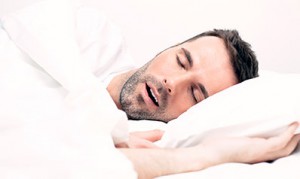 Apnea means halted breathing. Sleep apnea is a sleep disorder in which there are pauses in breathing while the person is sleeping. This can last for few seconds to several minutes.
Apnea means halted breathing. Sleep apnea is a sleep disorder in which there are pauses in breathing while the person is sleeping. This can last for few seconds to several minutes.
Most people who have sleep apnea don’t actually know that they have it because it only occurs during sleep. A family member or bed partner might be the first to notice signs of sleep apnea.When you try to breathe, any air that squeezes past the blockage can cause loud snoring.
The most common type of sleep apnea is obstructive sleep apnea. In this condition, the respiratory passage becomes blocked during sleep. This causes shallow breathing or breathing with pauses. Obstructive sleep apnea is more common in people who are overweight, but it can affect anyone; like children with enlarged tonsil tissues in their throat may have obstructive sleep apnea.
Major Signs and Symptoms:
One of the most common signs of obstructive sleep apnea is loud and chronic (ongoing) snoring. Pauses followed by chocking may occur while snoring.
Snoring usually is loudest when you sleep on your back; it might be less noisy when you turn on your side. There are chances that you might not snore every night. Over time, however, snoring can happen more often and get louder.
“Not everyone who snores has sleep apnea”
Others signs and symptoms of sleep apnea include:
- Morning headaches
- Memory or learning problems and not being able to concentrate
- Feeling irritable, depressed, or having mood swings or personality changes
- Dry mouth or sore throat when you wake up
- Sleepiness during day
In children, sleep apnea can cause hyperactivity and poor school performance. Day-time sleepiness results in threefold increased risk of road traffic accidents and a nine-fold increased risk of single-vehicle accidents.
Have questions? Send us your query and get expert opinion from our doctors.
Untreated sleep apnea can:
- Increase the risk of high blood pressure, heart attack, stroke, obesity
- Increase the risk of, or worsen, heart failure
- Make irregular heartbeats
Lifestyle Changes
If you have mild sleep apnea, some changes in daily activities or habits might be all the treatment you need.
- Avoid alcohol and medicines that make you sleepy. They make it harder for your throat to stay open while you sleep.
- Avoid smoking tobacco, smokers are three times more risked.
- Lose weight if you’re overweight or obese. Even a little weight loss can improve your symptoms.
- Sleep on your side instead of your back to help keep your throat open. You can sleep with special pillows or shirts that prevent you from sleeping on your back.
Get answers to all the questions regarding your ailment directly from Dr. Shah. Just send us your query.
Treatment for Sleep Apnea:
Homeopathy works at the root of the problem and removes causes like allergies, enlarged tonsils etc which can cause sleep apnea. Also symptomatic relief for snoring, lethargy, and headache is covered under homeopathy treatment. Whereas, conventional medicines have limited scope in giving relief and the problem generally relapses.
-Dr. Rashmi Vira, Associate doctor at Life Force Homeopathy.
Read more about Sleep Apnea on our website.
Can’t sleep? You might be suffering from Insomnia. Read about sleeplessness.




